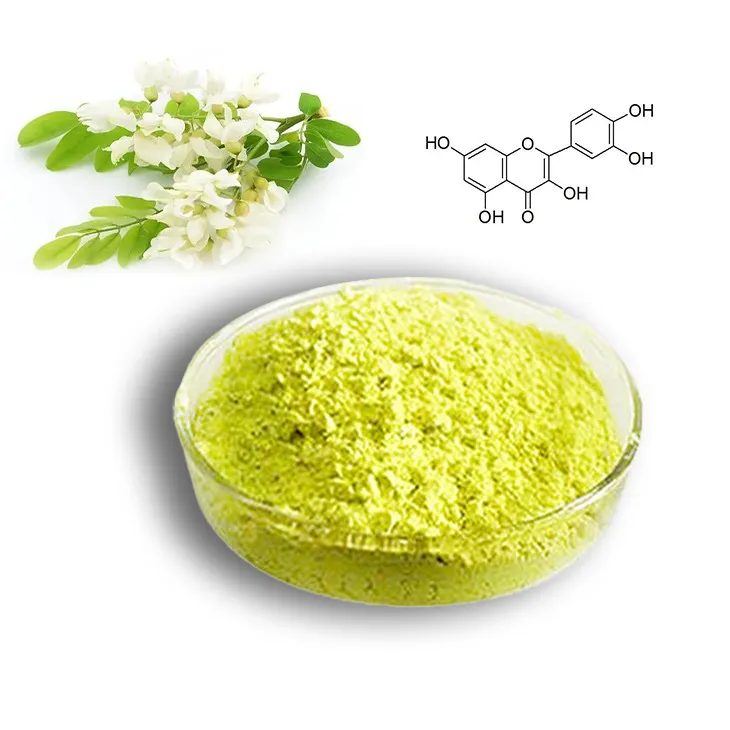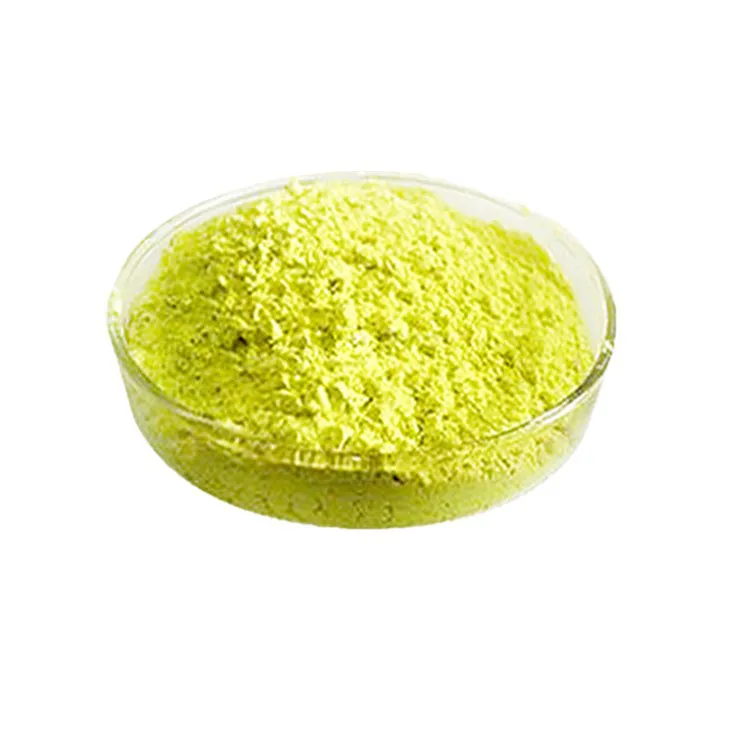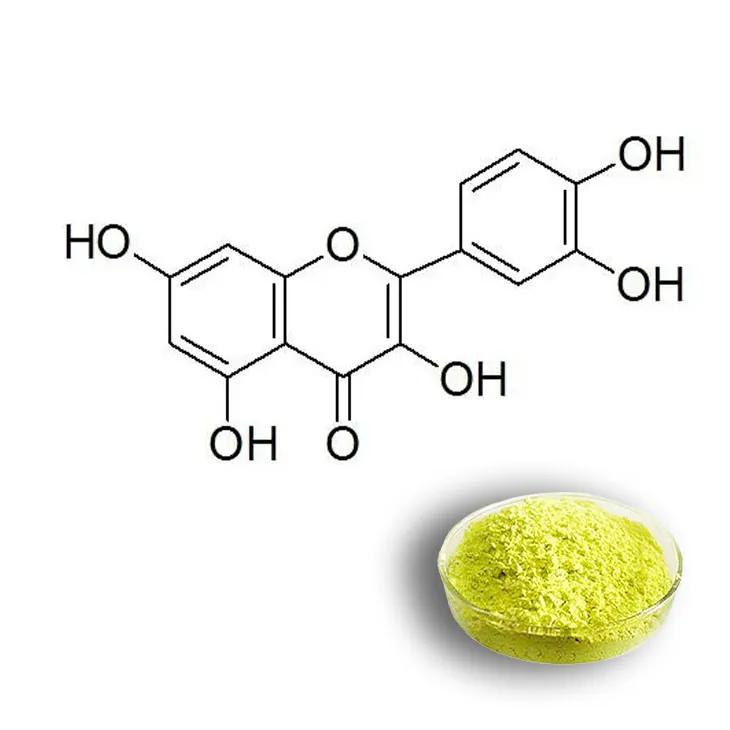- 0086-571-85302990
- sales@greenskybio.com
The Health Benefits of Quercetin Found in Grape Seeds
2024-08-10

Introduction
Grape seeds are a rich source of various beneficial compounds, and one of the most notable among them is Quercetin. Quercetin is a flavonoid that has been the subject of numerous scientific studies due to its wide range of potential health benefits. In this article, we will explore in detail the many ways in which Quercetin from grape seeds can contribute to our well - being.

Anti - Inflammatory Properties
Quercetin is well - known for its anti - inflammatory effects. Inflammation is a natural response of the body's immune system to injury or infection. However, chronic inflammation can lead to a host of health problems, including heart disease, diabetes, and certain types of cancer.
The anti - inflammatory action of quercetin is thought to occur through multiple mechanisms. It can inhibit the production of inflammatory mediators such as cytokines and prostaglandins. For example, in vitro studies have shown that quercetin can suppress the activation of nuclear factor - kappa B (NF - κB), a key regulator of inflammation - related genes.
In animal models, quercetin supplementation has been shown to reduce inflammation in various tissues. This suggests that it may have potential applications in the treatment or prevention of inflammatory diseases in humans. For instance, in a study on rats with arthritis, quercetin treatment led to a decrease in joint swelling and pain, indicating its anti - arthritic potential.

Benefits for Skin Health
Quercetin in grape seeds plays an important role in promoting healthy skin. One of the main ways it does this is by protecting against oxidative stress. The skin is constantly exposed to environmental factors such as ultraviolet (UV) radiation, pollution, and chemicals, which can generate free radicals. These free radicals can damage skin cells, leading to premature aging, wrinkles, and skin disorders.
Quercetin is a powerful antioxidant that can neutralize free radicals. It can scavenge reactive oxygen species (ROS) and prevent lipid peroxidation in skin cells. By doing so, it helps to maintain the integrity of the skin's lipid barrier, which is crucial for keeping the skin hydrated and protected.
In addition to its antioxidant effects, quercetin also has anti - inflammatory properties that are beneficial for the skin. Skin inflammation can be caused by a variety of factors, including allergies, infections, and autoimmune disorders. Quercetin can help to reduce skin inflammation, soothe irritated skin, and promote the healing of skin wounds.
Anti - Aging Effects
As mentioned earlier, quercetin can protect the skin from free radical damage, which is one of the main causes of skin aging. By reducing oxidative stress, it can slow down the formation of wrinkles, fine lines, and age spots.
Moreover, quercetin can stimulate the production of collagen in the skin. Collagen is a protein that provides structural support to the skin, keeping it firm and elastic. As we age, the production of collagen decreases, leading to sagging skin. Quercetin can help to boost collagen synthesis, thereby improving the skin's texture and reducing the signs of aging.
Protection Against Skin Disorders
Quercetin has been shown to have potential in the treatment and prevention of various skin disorders. For example, in cases of eczema and psoriasis, which are chronic inflammatory skin diseases, quercetin's anti - inflammatory and antioxidant properties may help to reduce symptoms such as itching, redness, and scaling.
It may also have a role in protecting against skin cancer. UV radiation is a major risk factor for skin cancer, and quercetin can block UV - induced DNA damage in skin cells. While more research is needed in this area, these findings suggest that quercetin could be a promising natural compound for skin cancer prevention.

Role in Maintaining Cellular Function
Quercetin is involved in maintaining proper cellular function throughout the body. At the cellular level, it can interact with various signaling pathways and molecules.
One important aspect is its effect on mitochondrial function. Mitochondria are the powerhouses of the cell, responsible for generating energy in the form of adenosine triphosphate (ATP). Quercetin can improve mitochondrial function by enhancing the efficiency of oxidative phosphorylation and protecting mitochondria from oxidative damage.
It also plays a role in cell - cycle regulation. By modulating the activity of cell - cycle proteins, quercetin can help to prevent abnormal cell growth and division, which is important for reducing the risk of cancer. For example, in some cancer cell lines, quercetin has been shown to induce cell - cycle arrest, leading to the inhibition of cancer cell proliferation.
Additionally, quercetin can affect cellular communication. It can influence the expression of cell adhesion molecules and gap junction proteins, which are involved in cell - to - cell communication. Proper cellular communication is essential for the normal functioning of tissues and organs.

Immune - System Support
The immune system is our body's defense mechanism against foreign invaders such as bacteria, viruses, and fungi. Quercetin can support the immune system in several ways.
It has immunomodulatory properties, meaning it can enhance or regulate the immune response as needed. For example, in cases of a weakened immune system, quercetin can stimulate the production of immune cells such as lymphocytes and macrophages.
Quercetin can also help the immune system to better recognize and respond to pathogens. It can enhance the phagocytic activity of macrophages, which are cells that engulf and destroy foreign particles. This makes the immune system more efficient in clearing infections.
During viral infections, quercetin has shown some potential antiviral effects. It can interfere with the replication of certain viruses, such as influenza virus. Although more research is required to fully understand its antiviral mechanisms, these findings suggest that quercetin could be a useful adjunct in the prevention and treatment of viral infections.
Cardiovascular Health Benefits
Quercetin has several beneficial effects on cardiovascular health. One of the main ways it promotes heart health is by reducing oxidative stress in the blood vessels. Oxidative stress can damage the endothelial cells that line the blood vessels, leading to endothelial dysfunction. Endothelial dysfunction is associated with an increased risk of atherosclerosis, hypertension, and heart disease.
Quercetin can also lower blood pressure. It can relax the smooth muscle cells in the blood vessel walls, leading to vasodilation and a reduction in blood pressure. In some studies, quercetin supplementation has been shown to significantly decrease systolic and diastolic blood pressure in hypertensive individuals.
Another important aspect is its effect on lipid metabolism. Quercetin can lower blood cholesterol levels, particularly low - density lipoprotein (LDL) cholesterol, which is often referred to as "bad" cholesterol. By reducing LDL cholesterol, it helps to prevent the build - up of atherosclerotic plaques in the arteries.
In addition, quercetin has anti - platelet aggregation properties. Platelets are blood cells that play a key role in blood clotting. Excessive platelet aggregation can lead to the formation of blood clots, which can block blood vessels and cause heart attacks or strokes. Quercetin can inhibit platelet aggregation, thereby reducing the risk of thrombosis.
Conclusion
In conclusion, quercetin found in grape seeds offers a wide range of health benefits. Its anti - inflammatory, antioxidant, and other properties make it a valuable compound for promoting skin health, maintaining cellular function, supporting the immune system, and protecting cardiovascular health.
While more research is still needed to fully understand the mechanisms of action and the optimal dosage for various health conditions, the existing evidence suggests that incorporating grape seeds or quercetin supplements into our diet may be a beneficial strategy for improving overall health. However, it is always important to consult a healthcare professional before starting any new supplement regimen.
FAQ:
What are the main health benefits of quercetin found in grape seeds?
Quercetin in grape seeds has several main health benefits. It has anti - inflammatory effects, which can help with various health problems. It also promotes healthy skin by protecting against aging and skin disorders. Moreover, it is involved in maintaining proper cellular function throughout the body.
How does quercetin in grape seeds help with skin health?
Quercetin in grape seeds helps with skin health in multiple ways. It has properties that protect against aging, such as reducing the appearance of wrinkles. It also defends against skin disorders by potentially strengthening the skin's natural defenses and maintaining its overall health.
Can quercetin in grape seeds reduce inflammation?
Yes, quercetin in grape seeds is known for its anti - inflammatory effects. By reducing inflammation, it can potentially alleviate various health issues associated with chronic inflammation in the body.
How does quercetin in grape seeds maintain cellular function?
Quercetin in grape seeds may maintain cellular function by providing necessary support at the cellular level. It could be involved in processes such as cell signaling, nutrient uptake, and waste removal within cells, which are all crucial for proper cellular function.
Is quercetin in grape seeds safe for everyone?
While quercetin in grape seeds generally offers health benefits, it may not be suitable for everyone. Some people may be allergic to it. Also, those taking certain medications should consult a doctor before consuming products rich in quercetin, as it may interact with medications.
Related literature
- The Role of Quercetin in Grape Seeds: A Comprehensive Review of its Health - Promoting Properties"
- "Quercetin from Grape Seeds: Mechanisms of Action for Health Benefits"
- "Grape Seed Quercetin: Unraveling its Impact on Inflammation and Skin Health"
- ▶ Hesperidin
- ▶ citrus bioflavonoids
- ▶ plant extract
- ▶ lycopene
- ▶ Diosmin
- ▶ Grape seed extract
- ▶ Sea buckthorn Juice Powder
- ▶ Beetroot powder
- ▶ Hops Extract
- ▶ Artichoke Extract
- ▶ Reishi mushroom extract
- ▶ Astaxanthin
- ▶ Green Tea Extract
- ▶ Curcumin Extract
- ▶ Horse Chestnut Extract
- ▶ Other Problems
- ▶ Boswellia Serrata Extract
- ▶ Resveratrol Extract
- ▶ Marigold Extract
- ▶ Grape Leaf Extract
- ▶ blog3
- ▶ blog4
- ▶ blog5
-
Coix Seed Extract
2024-08-10
-
Ivy Extract
2024-08-10
-
Baicalin
2024-08-10
-
Curcumin
2024-08-10
-
Avocado Extract Powder
2024-08-10
-
Beetroot Powder
2024-08-10
-
Reishi mushroom extract
2024-08-10
-
Black Rice Extract
2024-08-10
-
Red Vine Extract
2024-08-10
-
Quercetin
2024-08-10




















